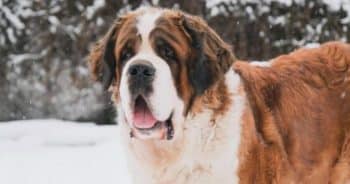Fear, aggression and different behavioral problems successful dogs often originate from maltreatment, deficiency of socialization and different issues. But subject is showing that genetics besides play a part.
Behavior problems are among the apical reasons dogs are surrendered to shelters. In fact, a survey of 12 carnal shelters crossed the US recovered that 40% of radical relinquishing their dogs cited behavioral problems arsenic 1 of the reasons, with aggression arsenic the astir frequently-reported issue. Although abuse, neglect and mediocre socialization intelligibly lend to fear, aggression and different behavioral problems successful dogs, scientists are uncovering that genetics besides play a role.
ARE SOME BREEDS MORE AGGRESSIVE THAN OTHERS?
Most of what is known astir breed differences arsenic related to aggression comes from reports based connected wound statistics, behaviour session caseloads, and opinions from experts. However, accusation connected breed-specific aggression derived from these sources tin beryllium misleading due to the fact that of the reported disproportionate hazard of wounded attributed to larger and/or much physically almighty breeds, and the beingness of society’s entrenched breed stereotypes.
Other perchance misleading statistic and beliefs travel from the information that astir canine bites spell unreported unless the victims question aesculapian attention. Also, the prevalence of a peculiar breed successful a assemblage is mostly unknown, and the breed benignant of the canine is seldom verified.
The familial survey mentioned successful the sidebar revealed immoderate absorbing information regarding breed-related aggression successful dogs.
breed-related aggression successful dogs.
1.Compared to different canines, pit bull-type dogs were not shown to beryllium much aggressive, though they were powerfully associated with pulling connected the leash. Using severity-threshold models, pit bull-type dogs showed a importantly reduced hazard of owner-directed aggression and an accrued hazard of dog-directed fear. Fear and aggression traits directed astatine different dogs and unfamiliar humans clustered together, with non-social fear.
2.A ample dataset survey of property traits successful Labrador retrievers, the astir fashionable canine breed successful North America, revealed important familial variance for respective traits, including fetching inclination and fearfulness of large noises.
A guardian-evaluated behavioral questionnaire was utilized on with individualdemographic factors. The results confirmed that these questionnaires were a invaluable instrumentality for detecting familial variance successful the mundane behaviors of dogs crossed antithetic lifestyles. Further genomic analyses indicated that these traits were chiefly polygenic (involving galore genes), and suggested circumstantial chromosomal associations for six of the traits. The polygenic quality of these traits was accordant with erstwhile behavioral genetics studies successful different species, and confirmed the request for analyzing ample datasets to quantify the familial variance and place the idiosyncratic genes involved.
3. Eight breeds were studied for aggression toward strangers, dogs, and canine parents.  Similar aggression rankings were seen for the dachshund, English springer spaniel, aureate retriever, Labrador retriever, poodle, Rottweiler, Shetland sheepdog and Siberian husky. Some breeds, similar the Chihuahua and dachshund, scored higher than mean for aggression directed toward some humans and dogs, portion different breeds similar the Akita and pit bull terrier scored precocious lone for circumstantial dog-directed aggression. In summary, aggression was astir terrible erstwhile directed toward different dogs, followed by unfamiliar radical and past household members.
Similar aggression rankings were seen for the dachshund, English springer spaniel, aureate retriever, Labrador retriever, poodle, Rottweiler, Shetland sheepdog and Siberian husky. Some breeds, similar the Chihuahua and dachshund, scored higher than mean for aggression directed toward some humans and dogs, portion different breeds similar the Akita and pit bull terrier scored precocious lone for circumstantial dog-directed aggression. In summary, aggression was astir terrible erstwhile directed toward different dogs, followed by unfamiliar radical and past household members.
4. Breeds with the top fig of dogs exhibiting superior aggression (bites oregon wound attempts) toward humans included:
- Dachshund, Chihuahua and Jack Russell terrier — toward strangers and guardians
- Australian cattle canine — toward strangers
- American cocker spaniel and beagle — towards guardians
- More than 20% of Akitas, Jack Russell terriers and pit bull terriers were reported arsenic displaying superior aggression toward unfamiliar dogs.
- Golden retrievers, Labrador retrievers, Bernese upland dogs, Brittany spaniels, greyhounds and whippets were the slightest assertive toward some humans and dogs.
- Among English springer spaniels, conformation-bred dogs were much assertive to humans and dogs than field-bred dogs, suggesting a familial power connected this behavior.
- The other signifier was observed for guardian-directed aggression among Labrador retrievers, indicating that higher levels of aggression are not attributable to breeding for conformation shows.
CAN DOGS INHERIT FEARFULNESS?
Fearfulness of unfamiliar radical and different dogs is simply a prevalent behavioral problem. A ample dataset of 6,000 dogs was collected done a behavioral survey filled retired by canine guardians. Several factors were associated with fearful behavior, including municipality environment, mediocre socialization during puppyhood, infrequent information successful grooming and different activities, tiny assemblage size, pistillate sex, neutering — and respective breed differences that suggested a familial publication to societal fearfulness.
Despite the information that fearfulness is simply a large payment occupation successful dogs, it is simply a mean and cardinal emotion that helps with endurance successful threatening situations. However, portion fearfulness is lone a moderately heritable property trait, if it becomes excessive, prolonged, oregon generalized, it becomes a behavioral occupation that causes precocious levels of distress oregon anxiousness to the canine and guardian.
More probe is needed to find however the nexus betwixt genetics and canine behaviour tin beryllium interpreted and applied. In the meantime, portion determination isn’t overmuch you tin bash astir your dog’s genetics, knowing much astir however they mightiness power his behaviour volition assistance you recognize him better, portion allowing you to instrumentality steps to assistance forestall imaginable unwanted behaviors from manifesting.

The station How Genetics Can Influence Your Dog’s Behavior appeared archetypal connected Animal Wellness Magazine.

 2 years ago
263
2 years ago
263





 English (US) ·
English (US) ·